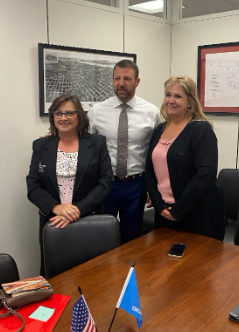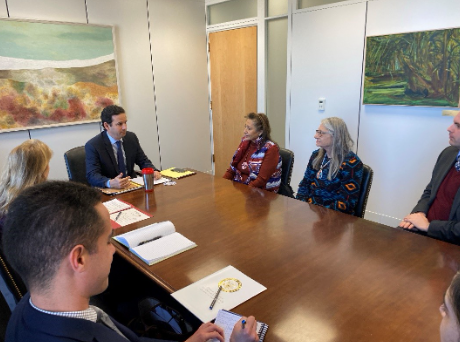Special Diabetes Program for Indians Receives First Funding Increase in Decades
 The Special Diabetes Program for Indians (SDPI), one of the most successful public health programs in the United States, has been reauthorized by Congress with its first funding increase in 20 years. The SDPI was reauthorized in the minibus package (P.L. 118-42) passed by Congress on March 8, 2024, and the program was reauthorized through December 31, 2024. Congress reauthorized the program at a new funding level, putting SDPI at $160 million annually. SPDI had previously been funded at $150 million annually.
The Special Diabetes Program for Indians (SDPI), one of the most successful public health programs in the United States, has been reauthorized by Congress with its first funding increase in 20 years. The SDPI was reauthorized in the minibus package (P.L. 118-42) passed by Congress on March 8, 2024, and the program was reauthorized through December 31, 2024. Congress reauthorized the program at a new funding level, putting SDPI at $160 million annually. SPDI had previously been funded at $150 million annually.
Senators Susan Collins (R-Maine) and Jeanne Shaheen (D-N.H.) worked to secure the first increase for the program in 20 years. Tribal Leaders and NIHB staff worked effortlessly in collaboration with Capitol Hill champions to ensure the SDPI reauthorization included the long-deserved increase for this highly successful program. The Tribal Leaders Diabetes Committee (TLDC) members participated in Capitol Hill advocacy in the fall of 2023, visiting Senate and House offices to raise awareness for the program’s success and needs. The SDPI has proven to be a highly impactful public health model to address specific community and cultural needs, demonstrating decreases in the incidence of Type 2 Diabetes and Prediabetes in American Indian and Alaska Native communities. SDPI has also been linked with government savings over time to the Medicare Program of $520 million by reducing the need and reliance on diabetes-related end-stage renal disease treatment.
 The reauthorization provided approximately $10 million in new funding for the program. This means SDPI will see an increase in both FY 2024 and FY 2025. The authorization in the minibus adjusted the daily rate for the program from $410,958 to $438,356. The new annualized rate funds SDPI at the $160 million level going forward. In real terms, SDPI will receive a total of $155,424,657 in FY 2024. This total includes the totals from the four Continuing Resolutions (CRs) passed by Congress at the $150 million annualized level, plus the funds made available in the minibus bill at the $160 million annualized level between March 9 and September 30, 2024. FY 2025 will see SDPI funded at $160 million if it is reauthorized at the current annualized rate. SDPI is currently funded through Q1 FY 2025 for $40 million. The total increase SDPI has received in funding through the end of calendar year 2024 is approximately $8 million.
The reauthorization provided approximately $10 million in new funding for the program. This means SDPI will see an increase in both FY 2024 and FY 2025. The authorization in the minibus adjusted the daily rate for the program from $410,958 to $438,356. The new annualized rate funds SDPI at the $160 million level going forward. In real terms, SDPI will receive a total of $155,424,657 in FY 2024. This total includes the totals from the four Continuing Resolutions (CRs) passed by Congress at the $150 million annualized level, plus the funds made available in the minibus bill at the $160 million annualized level between March 9 and September 30, 2024. FY 2025 will see SDPI funded at $160 million if it is reauthorized at the current annualized rate. SDPI is currently funded through Q1 FY 2025 for $40 million. The total increase SDPI has received in funding through the end of calendar year 2024 is approximately $8 million.

Although SDPI has been reauthorized, it will expire again soon on December 31, 2024. Congress will need to reauthorize SDPI before that deadline. The good news is that SDPI has legislation in Congress to reauthorize the program at $170 million annually for two full years, and that legislation has already gone through regular order. The House passed H.R. 5378, the Lower Costs, More Transparency Act, which includes SDPI reauthorization. The Senate has also passed a clean bill to reauthorize SDPI out of the Senate Health, Education, Labor, and Pensions Committee (S. 1855), which awaits a vote in the full Senate.
The National Indian Health Board (NIHB) has already started to raise awareness of the new funding cliff and the need to further reauthorize the program. Failure to reauthorize SDPI will create unnecessary program uncertainty and impact the continuity of care for the patients who depend on this highly effective program. If your Tribe or program is interested in engaging on SDPI reauthorization, you can reach out to your elected members of Congress. NIHB has data and advocacy resources available for those looking to get involved. If you will be in Washington, DC, NIHB can help with outreach to Capitol Hill while you are visiting.

National Indian Health Board
50 F St NW, Suite 600 | Washington, DC 20001 | Phone: 202-507-4070 | Email: [email protected]